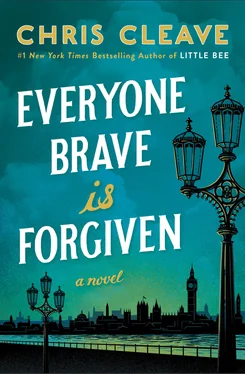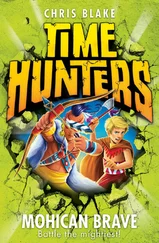“Hilda,” she said. “Could you come as quick as you can?”
Outside, the mother was still shouting, the fear in her voice more awful now the crowd was quietening down. Mary made sure that the place she was kneeling couldn’t be seen from the street. She flicked her lighter back on, and set it on an upended toy box.
“Oh,” said Hilda when she came in.
They knelt beside the boy’s body. Hilda put her ear to his mouth.
“Anything?” said Mary.
Hilda shook her head. The mess was not from a broken pipe. The boy’s insides were out.
“Oughtn’t we to pump his chest?” said Mary.
“How should I know?” said Hilda in a small voice. “It might make it worse.”
“Worse how?”
Hilda knelt very still with her back straight.
“Come on, Hilda, what shall we do?”
“I think it might be hopeless,” said Hilda.
“But there must be something we can do. There must have been something in the training?”
“I’m sorry,” said Hilda, covering her face with her hands.
The boy was brown-haired, slight, eight or nine years old. His eyes were open and his gray face was fixed in an agony that was hard to look at. In his bedroom there were postcards on the wall: silhouettes of every aircraft type. On a chest of drawers was a trophy collection of the kind boys had: fallen iron splinters, a brass shell case from a Bofors gun, a scrap of tortured aluminium that looked as if it might have flown. The metal on its ridges had been polished to a shine by the boy’s fingers. Outside, the mother in a raw voice was shouting, “Mouse! Mouse!”
Mary stood, took her lighter and left the room. Outside on the warped landing, she fought back nausea. The stripe along the center of the carpet was not a pattern after all. Even now the stain was widening as the sisal took it up. Mary lit a cigarette. The boy had been downstairs when the bomb hit and he had dragged himself up to his room, and died.
“Hilda?” she said.
Hilda came, and Mary passed her the lit cigarette. Hilda couldn’t hold it, and so Mary held it to her lips for her while she drew on it, then exhaled.
“What are we doing?” said Mary. “What are the two of us doing?”
Hilda hugged herself tight around the stomach. “Don’t.”
“Remember after that first raid? When we took a cab to see the mess?”
“But everyone was doing it, it wasn’t just—”
Mary cut her off. “Do you think we’ve seen enough now?”
“But it’s different now. We’re helping.”
“Are we?” said Mary. “How many rooms are there in your flat?”
“Oh I know what you’re trying to do, but—”
“Isn’t it awful? I’ve honestly never counted. Two dozen rooms in my house, I should think, and six in your flat, and hardly a bomb has touched Pimlico. If we truly wanted to help, we could have hosted this whole street in your place and mine, instead of digging through their rubble.”
“We do what we can.’
“We visit by night and we fly west at dawn. We are ghouls, I’m afraid. We are monsters.”
Hilda closed her eyes and let her head fall back against the wall. “So what would you have us do?”
“I don’t know. We’ve never done anything, have we? We’ve no talent but conversation.”
“Then go and talk to the policeman who’s with the mother. Have her taken somewhere. Then bring Huw and Clive. Quickly, while I can still cope.”
Mary stared for a moment, until understanding passed between them.
“Oh,” she said.
When Mary came back with Huw and Clive, Hilda had rolled the dead boy in the rug that he had bled on in his bedroom. They took up the runner on the stairs and the landing, and made a second roll from that. They carried both rolls out on stretchers, each covered with the standard gray blanket, and secured them on the roof of the Hillman.
At dawn, the sun rising through smoke, they delivered the boy to Moorgate. In fine cursive Hilda wrote in the mortuary logbook that the child had died instantly and with no suffering, in a tidy and well-kept home. This was what the mother would read when she came for her son’s body.
They went to the party and got nastily drunk at opposite ends of the room. Hilda left with a flight lieutenant. Mary left with a spinning head and a certainty that she was not up to encountering her mother. She walked to a taxi rank and gave the address of the garret.
She sat in the cab with her cheek pressed against the window. She watched London, with its gapped teeth and blinded eyes. It got to her all at once, for the first time since the disaster. All the emptiness in the world drew her in, and she rolled her forehead on the glass. There was no sense to it — this was the unendurable thing. The war was ten million severed and jangling nerves. It was all loose ends.
Before, life had been a tradition, a tendency to forgiveness, a regression to the mean. The city she loved had been one of plane trees that had grown for three centuries, of bridges improved as horse gave way to steam, of great coordinated endeavors in which every convergent component could be relied upon: of symphonies. But now any light could be snuffed without warning. When she had seen the dead boy, she had thought of Zachary. A child was lost as easily as a shilling. And once one had understood that, though one’s heart continued to beat, one was never entirely alive again. She knew, now, why her father had not spoken of the last war, nor Alistair of this. It was hardly fair on the living.
On reaching her destination she was pale and the taxi driver asked her, ‘”Are you all right, my love?” and she smiled brightly and said, “Yes, thank you.”
When she let herself in to the garret it still smelled faintly of Tom. She switched on the electric heater, took off her shoes and lay down on his bed. When she opened her eyes again, Tom had made her tea in one of his stock of jam jars that resisted all her attempts at improvement. She sat up to kiss him, since she tried hard to show him that everything was all right, and as she kissed him she woke up and it was noon.
She washed her face in the corner basin, with cold water and a small gray fossil of soap. Everything remaining in the garret was Alistair’s. She had boxed Tom’s possessions weeks ago, and sent them to his mother. When everything he had owned was packed and labeled, with Caesar in the last box and the tip of his tail just sticking out, Tom’s things had filled six cardboard boxes, each eighteen inches square by nine inches deep. The volume a man left was ten cubic feet.
Mary went to Alistair’s room, opened the wardrobe door, and stood looking at his empty clothes. She pressed his shirts to her face. She noticed a cuff that was beginning to fray, found a needle and thread and sat down to mend it. She was not at all good at needlework. At home the rule was that the maid did anything fiddlier than dealing cards, while Palmer lifted anything heavier than a gramophone arm.
She forced herself to be patient; to keep her stitches small and neat. It was something to do. If she could bring little to the war, nor bear to side with her mother in avoiding the whole thing entirely, then at least she could fix these frayed edges.
When the shirt was mended, Mary hung it back in Alistair’s cupboard. And then, because she needed to live for the new hour at least, and because a pen and paper were available, she sat down at Alistair’s rickety table and wrote to him again.
FOR A WHOLE MONTH the northwest wind blew cold and imperious. The siege drew taut around the island. The enemy’s capital ships, black hearted and lupine, circled just below the horizon where the coastal artillery could not reach them. Their warplanes wound white ropes of vapor around the blue dome of the sky, weaving the island a net to starve in.
Читать дальше












